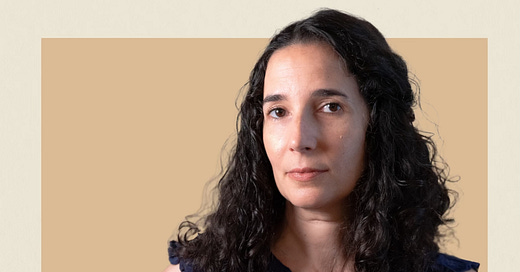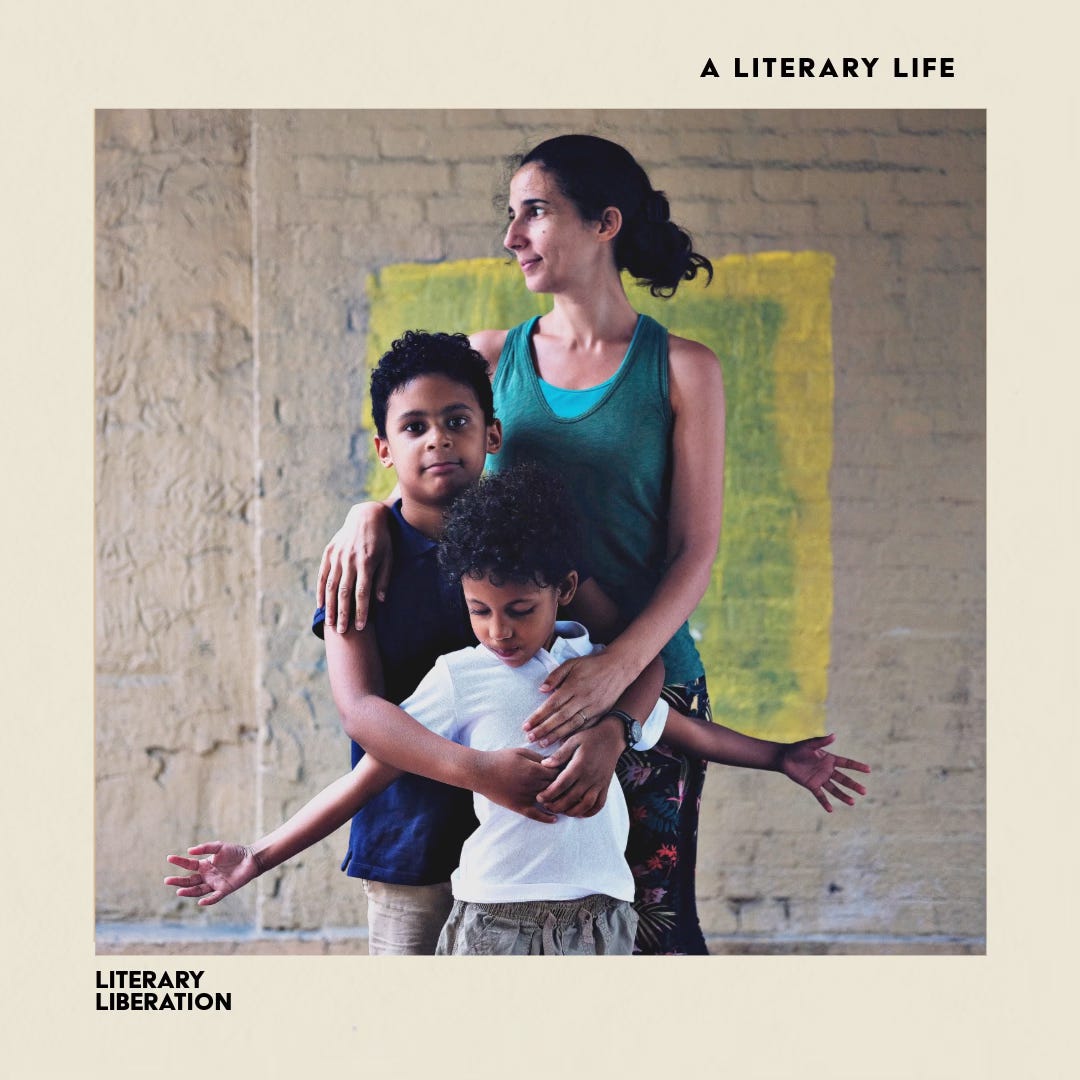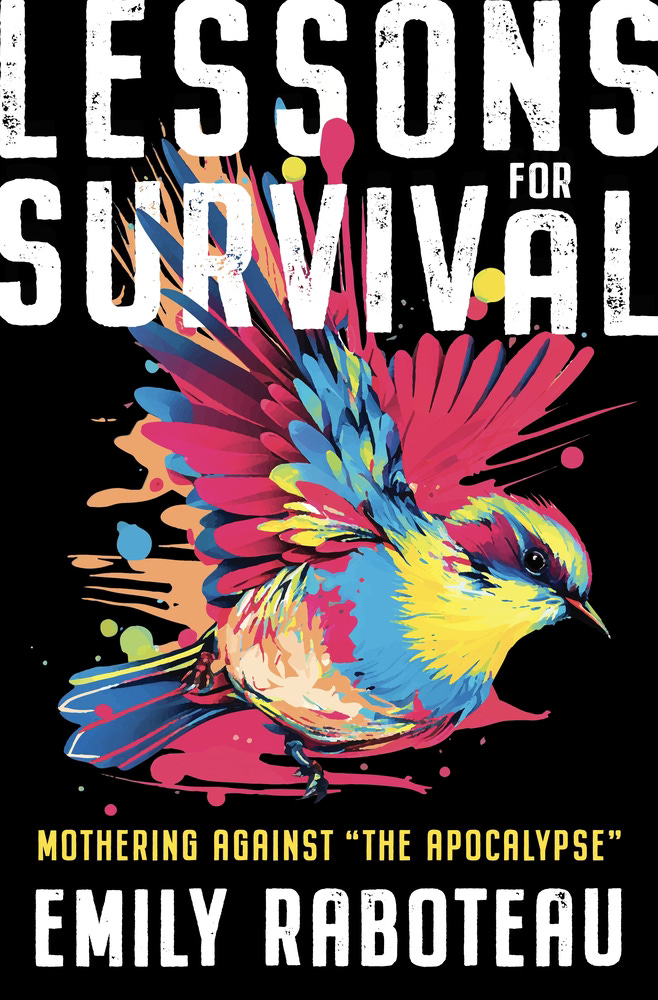"I’m interested in utopia and the impediments to utopia." Emily Raboteau's Literary Life
Emily Raboteau, author of her most recent work, LESSONS FOR SURVIVAL: MOTHERING AGAINST "THE APOCALYPSE" talks about the importance of being understood.
I’ve always been very curious about the life that brings a writer to the pen or keyboard. My hope is that in getting to know authors in a new light, we might find ourselves in the process. Today, we are featuring our fourth author, Emily Raboteau.
If you’re new here, welcome! Literary Liberation is an exclusively reader-supported publication. Sign up so you don’t miss anything! To support this work, and our contributors, become a paid subscriber.
Emily Raboteau (she/her) writes at the intersection of social and environmental justice, race, climate change, and parenthood. Her latest book is Lessons for Survival: Mothering Against “the Apocalypse.” A contributing editor at Orion Magazine and a regular contributor to the New York Review of Books, Raboteau is a full professor at the City College of New York (CUNY) in Harlem, once known as “the poor man’s Harvard.” She lives in the Bronx.
What inspired you to start writing?
Teachers told me that I was good at it from a young age. Teachers have so much influence on young people. Now that I’m a teacher myself, I think about this all the time. It’s a great responsibility to be in the position to inspire and influence young people’s sense of their possibilities.
Can you describe your first piece of published work and how it felt to get published?
I had a biographical essay published in a journal called Cultural Diversity and Mental Health when I was an undergraduate. That was my first professional publication. I wrote it as an assignment for a class called “The Psychosocial Study of the Black Autobiography.” My professor was on the editorial board of this publication and thought it good enough to publish. It felt affirming to have my work singled out and recognized. I remember signing the contract and feeling professional.
Were there any early challenges or obstacles you faced when you started writing? How did you overcome them?
When I undertook to get my MFA in creative writing I found it very challenging to complete assignments on deadline. I still struggle with this. I haven’t overcome the challenge. I’m not great at managing my time. Every piece of writing I turn in is late.
Do you have any writing rituals that you follow?
I like to wear non-restrictive clothing and usually need ear plugs to block out noise in order to focus.
What’s your go-to snack or drink while writing?
If I’m writing in the morning, English Breakfast tea with oat milk and raw sugar.
What’s the strangest place you’ve found inspiration for a story?
Twitter/X, both as a source and a platform. I wrote a year-long climate essay as a Twitter thread that was published in New York magazine and then became a chapter in my book. It was crowd-sourced.
Can you show us or describe your writing space? What’s your ideal writing environment?
I have a home office that doubles as a guest bedroom. My favorite thing about it is the Turkish carpets. My desk is uncomfortable. It belonged to my late father. I need to replace it with something more functional but it has a lot of emotional weight. My ideal writing environment is an artist colony in a beautiful place where I am fed and in the company of other artists. I have done a lot of stints at writing residencies, both in the U.S. and abroad–though fewer since having kids. I did one in Brazil, one in Scotland, and one in Spain. My favorite one is MacDowell. You don’t tend to find a lot of mothers at these residencies.
How has your writing process evolved over time?
I’m less precious about it than I used to be. I just have to get the work done when I have childcare. I think I have both raised the bar for myself (in terms of subject matter) and lowered it (in terms of beautiful language). I want more to be understood than to be a stylist. Style still matters to me but precision and clarity matter more.
Can you discuss a pivotal moment in your writing career that significantly impacted your work?
When I won the American Book Award for my second book, Searching for Zion (2013), I got headhunted by another university for a target of opportunity hire. I used their job offer to renegotiate my contract so that my teaching load was reduced. That significantly impacted my work by giving me more time to write.
Who are some authors or books that have significantly influenced your writing throughout your career?
I’m lucky that I got to study with Grace Paley in my twenties. She had a wonderful ear for dialogue, was so funny on the page, and inspired me with her activism off the page. James Baldwin has been a lasting influence.
Do you feel a responsibility to address specific themes or issues in your writing? How do you go about that?
Since the 2018 International Governmental Panel on Climate Change (IPCC) report came out, I’ve felt responsible for addressing the climate crisis in one way or another in my writing.
Which of your works has impacted you the most after writing it, and in what way?
Probably my first book, The Professor’s Daughter (2005) impacted me the most materially in that it got me a job as a professor that has allowed me to financially sustain my writing life and offered a fairly flexible schedule.
Have you noticed any recurring themes or motifs in your writing? If so, what do they represent for you?
Identity, belonging, race, community, home, motherhood, social and environmental justice. These are my chronic themes. I’m interested in utopia and the impediments to utopia.
How do you handle critical reviews and feedback on your work?
I appreciate getting feedback from other trusted writers on early drafts of my work and I value editorial feedback from my editors, though sometimes I have to defend my choices. I don’t read critical reviews of my work. Sometimes I have my husband read reviews and tell me the good parts.
What do you do when you’re not writing? Any hobbies or interests outside of writing?
Honestly, I spend very little of my time writing, though I do try to write at least a little bit every weekday. I spend most of my time parenting and teaching. In my free time, if I have it, I like to garden, do yoga, or read for pleasure (as opposed to research).
What book(s) (besides your own) do you always recommend to others?
It depends upon who they are and what they’re into. I just recommended Sabrina Imbler’s How Far the Light Reaches: A Life in Ten Sea Creatures to a high school classmate of mine who teaches ninth grade biology because I thought it would make a good teaching tool for her students. Last week I recommended Braiding Sweetgrass: Indigenous Wisdom, Scientific Knowledge, and the Wisdom of Plants by Robin Wall Kimmerer to a young man volunteering for the Parks Department after he shared that he’s off to study in a master’s program in ecology this fall. I often recommend or gift Chico Bon Bon: Monkey with a Tool Belt by Chris Monroe to friends with toddlers. I don’t think of books as one size fits all.
What’s a fun fact about you that most of your readers might not know?
I worked in shoe stores as a teenager and am good at sizing people’s feet.
What is your favorite quote, and why does it resonate with you?
I don’t have a favorite quote, but this Adrienne Maree Brown quote from the Black Lives Matter era just resurfaced in my feed and struck me as helpful as I work on completing an essay about the daylighting (uncovering) of a buried stream in my neighborhood in the Bronx as an act of climate mitigation to help relieve flooding: “things are not getting worse, they are getting uncovered. we must hold each other tight & continue to pull back the veil.” Sometimes when I wake up with anxiety and am having difficulty falling back to sleep, I repeat a quote a yoga teacher named Harold shared in yoga class once: “The mind controls the body, but the breath controls the mind.” It reminds me to breathe deeply.
Are there any books or authors that you turn to for comfort or inspiration during difficult times?
Rilke’s poem, “Go to the Limits of Your Longing” never fails to move me out of stasis when things feel terrible. These lines, especially: “Let everything happen to you: beauty and terror. / Just keep going. No feeling is final.”
What do you hope people will take away from your work?
That grim asymmetries of power should be scrutinized and challenged.
Looking back, how do you think your writing has impacted your readers and the literary world?
I can’t pretend to know how it’s impacted anyone or presume that it has, but I hope that it’s made some people feel less alone along the way.
What advice would you give to aspiring writers?
Be systematic about your practice, set small goals, find or create a writerly community, and don’t quit your day job.
How do you see your writing evolving in the future? Are there new genres or styles you want to explore?
I hope it gets better as I mature. I like that barring dementia, writing is a craft we can improve upon as we age.
Do you have any upcoming projects or works in progress that you can share with us?
I’m finishing a novel about the intersecting lives and problems of the residents of a New York City apartment building, from the perspective of the building’s superintendent.
Thank you for reading this edition of A Literary Life. Before you go, leave us some love by tapping the ❤️. It offers “social proof” and lets others know there’s something valuable here. Consider becoming a paid subscriber, or sharing on social media or Substack notes! The more people become paying subscribers, the more time I can devote to cultivating this beautiful community.








